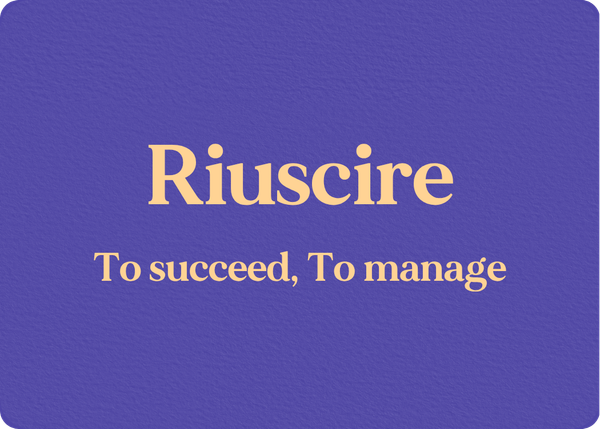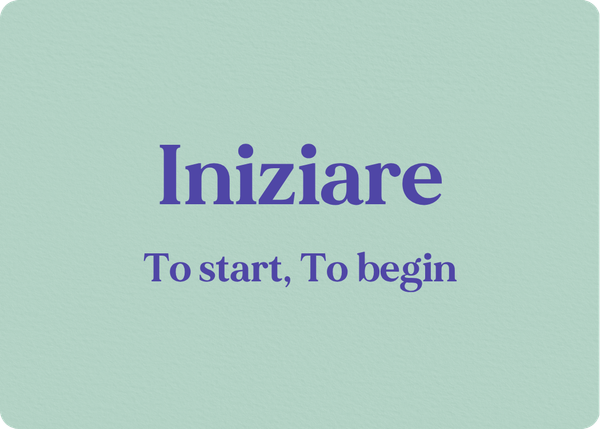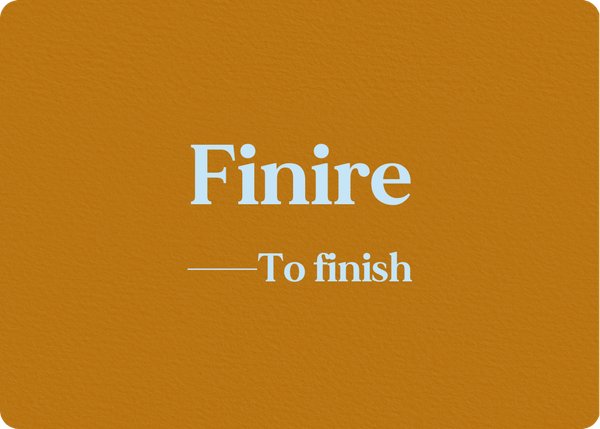What is Riuscire?
Riuscire is an irregular Italian verb meaning "to succeed", "to manage to", or "to be able to". It belongs to the third conjugation (-IRE verbs) but follows irregular patterns in some tenses. This verb is useful for expressing ability, success, and achievement in Italian conversation and is commonly used to indicate whether someone can accomplish something.
Key Features of Riuscire:
- Type: Irregular third conjugation verb (-IRE)
- Meaning: To succeed, to manage to, to be able to
- Irregularities: Present tense (riesco, etc.), present subjunctive (riesca, etc.), imperative (riesci, etc.)
- Auxiliary verb: Uses "essere" (to be) for conjugation in compound tenses
- Past participle: Riuscito
Indicativo – Indicative Mood
Presente (Present Tense)
| Person | Conjugation |
|---|---|
| io | riesco |
| tu | riesci |
| lui/lei | riesce |
| noi | riusciamo |
| voi | riuscite |
| loro | riescono |
Example:
Mia sorella riesce a cucinare piatti deliziosi con pochi ingredienti.
My sister manages to cook delicious dishes with few ingredients.
Passato Prossimo (Present Perfect)
| Person | Conjugation |
|---|---|
| io | sono riuscito/a |
| tu | sei riuscito/a |
| lui/lei | è riuscito/a |
| noi | siamo riusciti/e |
| voi | siete riusciti/e |
| loro | sono riusciti/e |
Example:
Bruno è riuscito a superare l'esame di matematica.
Bruno managed to pass the math exam.
Imperfetto (Imperfect)
| Person | Conjugation |
|---|---|
| io | riuscivo |
| tu | riuscivi |
| lui/lei | riusciva |
| noi | riuscivamo |
| voi | riuscivate |
| loro | riuscivano |
Example:
In quel periodo tu non riuscivi a dormire bene la notte.
In that period, you couldn’t sleep well at night.
Trapassato Prossimo (Past Perfect)
| Person | Conjugation |
|---|---|
| io | ero riuscito/a |
| tu | eri riuscito/a |
| lui/lei | era riuscito/a |
| noi | eravamo riusciti/e |
| voi | eravate riusciti/e |
| loro | erano riusciti/e |
Example:
Quando sono arrivato, Luigi era già riuscito a riparare la macchina.
When I arrived, Luigi had already managed to fix the car.
Passato Remoto (Simple Past)
| Person | Conjugation |
|---|---|
| io | riuscii |
| tu | riuscisti |
| lui/lei | riuscì |
| noi | riuscimmo |
| voi | riusciste |
| loro | riuscirono |
Example:
Dopo molti tentativi, riuscì finalmente ad aprire la porta bloccata.
After many attempts, he finally managed to open the stuck door.
Trapassato Remoto (Past Anterior)
| Person | Conjugation |
|---|---|
| io | fui riuscito/a |
| tu | fosti riuscito/a |
| lui/lei | fu riuscito/a |
| noi | fummo riusciti/e |
| voi | foste riusciti/e |
| loro | furono riusciti/e |
Example:
Dopo che fu riuscito a convincere tutti, smise di parlare.
After he had succeeded in convincing everyone, he stopped talking.
Futuro Semplice (Simple Future)
| Person | Conjugation |
|---|---|
| io | riuscirò |
| tu | riuscirai |
| lui/lei | riuscirà |
| noi | riusciremo |
| voi | riuscirete |
| loro | riusciranno |
Example:
Sono sicuro che riusciremo a raggiungere i nostri obiettivi.
I'm confident that we will succeed in reaching our goals.
Futuro Anteriore (Future Perfect)
| Person | Conjugation |
|---|---|
| io | sarò riuscito/a |
| tu | sarai riuscito/a |
| lui/lei | sarà riuscito/a |
| noi | saremo riusciti/e |
| voi | sarete riusciti/e |
| loro | saranno riusciti/e |
Example:
Quando tornerai in ufficio, sarò riuscito a finire la presentazione.
By the time you’re back at the office, I’ll have managed to finish the presentation.
Congiuntivo – Subjunctive Mood
Presente (Present Subjunctive)
| Person | Conjugation |
|---|---|
| che io | riesca |
| che tu | riesca |
| che lui/lei | riesca |
| che noi | riusciamo |
| che voi | riusciate |
| che loro | riescano |
Example:
Elena spera che Giacomo riesca a trovare un lavoro migliore.
Elena hopes that Giacomo succeeds in finding a better job.
Passato (Past Subjunctive)
| Person | Conjugation |
|---|---|
| che io | sia riuscito/a |
| che tu | sia riuscito/a |
| che lui/lei | sia riuscito/a |
| che noi | siamo riusciti/e |
| che voi | siate riusciti/e |
| che loro | siano riusciti/e |
Example:
Penso che siano riusciti a risolvere il problema tecnico.
I think they managed to solve the technical problem.
Imperfetto (Imperfect Subjunctive)
| Person | Conjugation |
|---|---|
| che io | riuscissi |
| che tu | riuscissi |
| che lui/lei | riuscisse |
| che noi | riuscissimo |
| che voi | riusciste |
| che loro | riuscissero |
Example:
Se Paola riuscisse a chiamarmi prima delle otto, potremmo sentirci con più calma.
If Paola were able to call me before eight, we could talk more calmly.
Trapassato (Past Perfect Subjunctive)
| Person | Conjugation |
|---|---|
| che io | fossi riuscito/a |
| che tu | fossi riuscito/a |
| che lui/lei | fosse riuscito/a |
| che noi | fossimo riusciti/e |
| che voi | foste riusciti/e |
| che loro | fossero riusciti/e |
Example:
Se fossimo riusciti a partire prima, non avremmo perso il volo.
If we had managed to leave earlier, we wouldn't have missed the flight.
Condizionale – Conditional Mood
Presente (Present Conditional)
| Person | Conjugation |
|---|---|
| io | riuscirei |
| tu | riusciresti |
| lui/lei | riuscirebbe |
| noi | riusciremmo |
| voi | riuscireste |
| loro | riuscirebbero |
Example:
Riuscirei a studiare meglio se ci fosse meno rumore.
I would manage to study better if there were less noise.
Passato (Past Conditional)
| Person | Conjugation |
|---|---|
| io | sarei riuscito/a |
| tu | saresti riuscito/a |
| lui/lei | sarebbe riuscito/a |
| noi | saremmo riusciti/e |
| voi | sareste riusciti/e |
| loro | sarebbero riusciti/e |
Example:
Saremmo riusciti ad arrivare puntuali, se il treno non avesse fatto ritardo.
We would have succeeded in arriving on time, if the train hadn't been delayed.
Imperativo (Imperative)
| Person | Conjugation |
|---|---|
| (tu) | riesci |
| (lui/lei) | riesca |
| (noi) | riusciamo |
| (voi) | riuscite |
| (loro) | riescano |
The imperative forms of riuscire are grammatically correct but sound unnatural in everyday Italian. Speakers prefer alternatives like cerca di… (“try to…”), prova a… (“try to…”).
Example:
Cerca di stare zitto!
Try keep quiet!
Indefinite Moods
Infinito (Infinitive)
- Presente (Present): riuscire (to succeed/to manage)
- Passato (Past): essere riuscito (to have succeeded/managed)
Examples:
È importante riuscire a mantenere la calma nelle difficoltà.
It’s important to manage to stay calm in difficulties.
È un peccato non essere riusciti a incontrarci prima delle vacanze.
It’s a pity we didn’t manage to meet before the holidays.
Participio (Participle)
- Passato (Past): riuscito (succeeded/managed)
Example:
L'esperimento è riuscito alla perfezione!
The experiment was perfectly successful!
Gerundio (Gerund)
- Presente (Present): riuscendo (succeeding/managing)
- Passato (Past): essendo riuscito (having succeeded/managed)
Examples:
Riuscendo a mantenere la calma, ha risolto la situazione.
By managing to stay calm, he/she solved the situation.
Essendo riuscita nell'impresa, ha ricevuto molti complimenti.
Having succeeded in the endeavor, she received many compliments.
The verb Riuscire at a glance: Key tenses you need
| Present | Present Perfect | Imperfect | Present Subjunctive | Imperfect Subjunctive | Present Conditional |
|---|---|---|---|---|---|
| io riesco | io sono riuscito/a | io riuscivo | che io riesca | che io riuscissi | io riuscirei |
| tu riesci | tu sei riuscito/a | tu riuscivi | che tu riesca | che tu riuscissi | tu riusciresti |
| lui/lei riesce | lui/lei è riuscito/a | lui/lei riusciva | che lui/lei riesca | che lui/lei riuscisse | lui/lei riuscirebbe |
| noi riusciamo | noi siamo riusciti/e | noi riuscivamo | che noi riusciamo | che noi riuscissimo | noi riusciremmo |
| voi riuscite | voi siete riusciti/e | voi riuscivate | che voi riusciate | che voi riusciste | voi riuscireste |
| loro riescono | loro sono riusciti/e | loro riuscivano | che loro riescano | che loro riuscissero | loro riuscirebbero |
Conclusion
Mastering the conjugation of "riuscire" is essential for expressing ability, success, and achievement in Italian. This irregular verb requires careful attention to its unique forms, particularly in the present tense and subjunctive mood.
Remember the key points:
- Uses "essere" as auxiliary verb for conjugation in compound tenses
- Shows some irregular forms
- Past participle is "riuscito"
- Essential for expressing success, ability, and achievement
Keep practicing with real sentences and you'll master this fundamental Italian verb for expressing accomplishments and capability in all situations!





